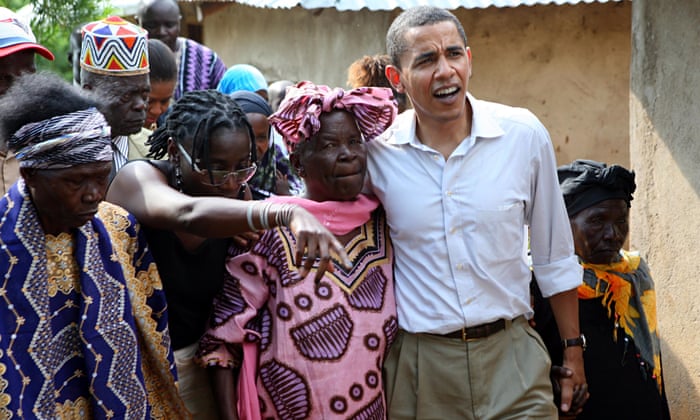In recent weeks all those figures have been overshadowed by the likeness of one man. At the gate a whole section is taken up by a full-face painting of President Barack Obama looking into the distance and wearing a wistful expression.
Kenya is in the grip of Obama-mania. For weeks, newspapers have led with numerous articles describing preparations for the trip at the end of the month and analysing its importance. Readers have been inundated with every detail about efforts to keep Obama safe, with tales about his limousine, “a tank on four wheels” (the Star), a favourite.
Roads have been relaid, malfunctioning street lights fixed, billboards erected and the highway between the airport and the central business district boasts a new garden – although social media users have been quick to note, witheringly, that the newly planted flowers are unlikely to have blossomed before Obama arrives.
At the airport, Obama will be received by Uhuru Kenyatta, whose presidential bid Washington semi-openly campaigned against because, at the time of the election in March 2013, he was facing indictment at the International Criminal Court for his alleged role in post-election violence that rocked the country at the end of 2007. The case has since been withdrawn.
The election of Kenyatta and his deputy, William Ruto, was seen as a significant embarrassment for western envoys who had warned the electorate that “choices have consequences” and their entry into office led to a deepening of Kenya’s relationship with China and strained ties with western allies.
“This will be a very significant visit,” says Professor Winnie Mitullah of the University of Nairobi. “Relations with the west hit a low not witnessed for decades in recent years and it will be a chance, in effect, to reset the partnership and create a new narrative.”
Some analysts say the rise of China has seen US administrations grow averse to criticising the governance and human rights records of governments in Africa. Campaigners complained that a summit of African heads of state in Washington last August focused on trade and security with little discussion on human rights, and many will be watching to see how Obama, whose strong words against official corruption in Kenya on his last visit as a senator in 2006 stirred a ruckus, will handle the issue.
Scott Gration, a retired general and former US ambassador to Kenya who grew up in east Africa and was an early supporter of Obama’s presidential campaign, says Obama remains a champion of the good governance agenda but argues that US dealings with the continent have to reflect shifting dynamics. “I believe we are witnessing a change in the international community’s engagement with Africa. President Obama’s focus on entrepreneurs [he will attend a global entrepreneurship summit] continues the positive shift from historical political-military relationships in Africa to a new series of economic-centric associations on the continent. To be truly successful, his visit must translate into substantial results that are sustained beyond the visit itself.”
Musa Ogilo, 67, a maize miller, said the area had witnessed a quick transformation since Obama became president, citing the levelling of roads and extension of the electricity grid to the village by local authorities. But he called on Obama to build a proper hospital in the village, illustrating the fact that many Kenyans struggle to distinguish between the president’s duty to US citizens and to the land of his father’s birth.
Commentators caution that the excitement surrounding the visit may cloud the main objective – the global entrepreneurship summit, which the White House describes as an effort to gather entrepreneurs and investors from around the world with the aim of spurring economic opportunity.
Despite its ethnicised and occasionally violent politics – and the growing menace of the al-Shabaab terror group which has carried out attacks and triggered fears it might try to disrupt the visit – Kenya boasts one of the best developed middle classes on the continent and has proved a big draw for US and European investors in recent years.
A financial analyst, Aly Khan Satchu, says Kenyan authorities would make a mistake if they allowed themselves to be caught up in the excitement surrounding the trip, which he compared to John F Kennedy’s trip to Ireland in 1963, and passed up the opportunity to sell the country’s merits to the world: “Kenya, and Nairobi in particular, is globally fluent, has 21st-century connectivity and an impressive pool of human capital.”
It’s a view echoed by Chad Larson, one of three co-founders of one of the most successful enterprises driven by the success of mobile money transfers in Kenya, M-Kopa. The business, incubated in part in chats between Larson and fellow students at Oxford University, sees users pay a deposit of about $35 for a solar system worth about $200 before settling the balance using mobile money transfers over a year.
Evans Yegon’s expectations are decidedly more straightforward. “I just hope I can reach him and that he takes this painting away with him.”
Additional reporting by Nelcon Odhiambo

No comments:
Post a Comment